#Alta Gerrey
Photo
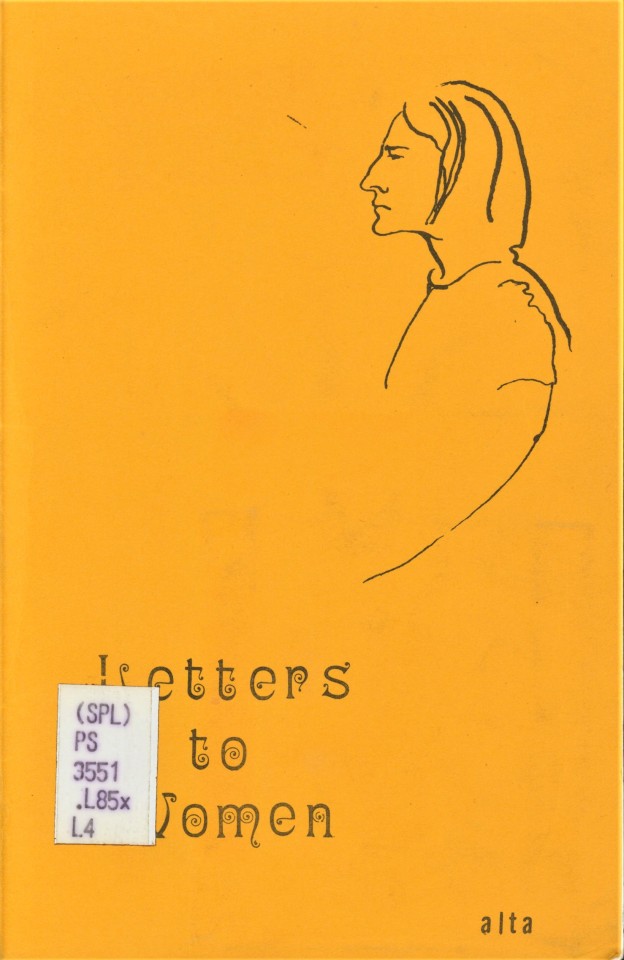
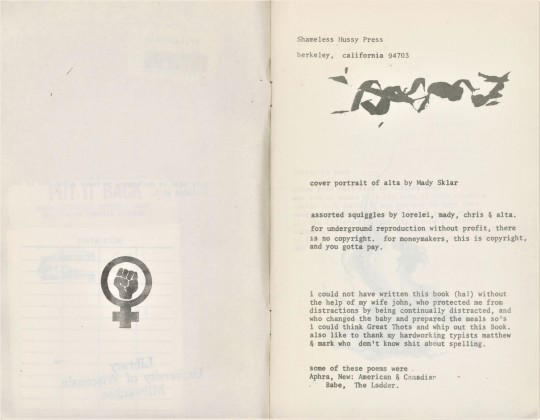
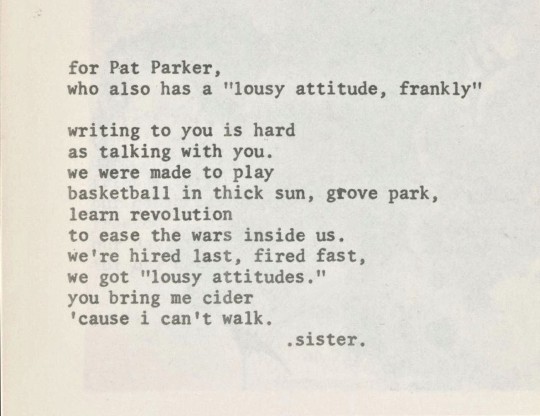
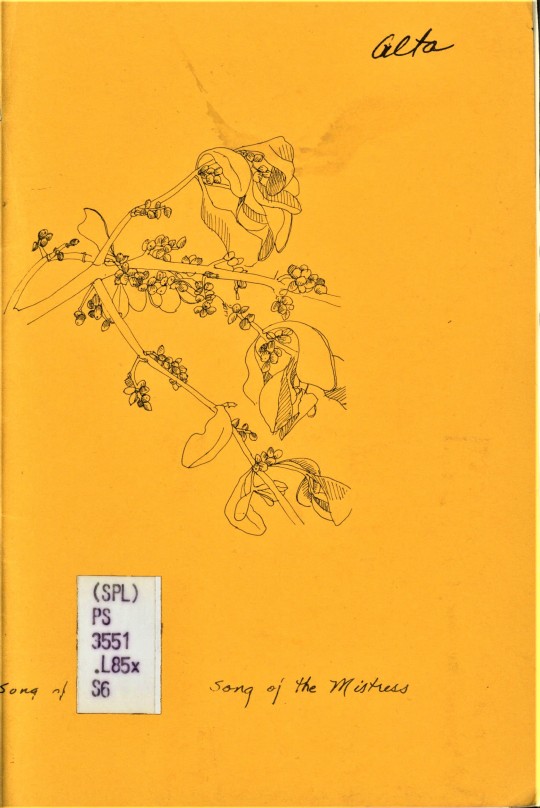
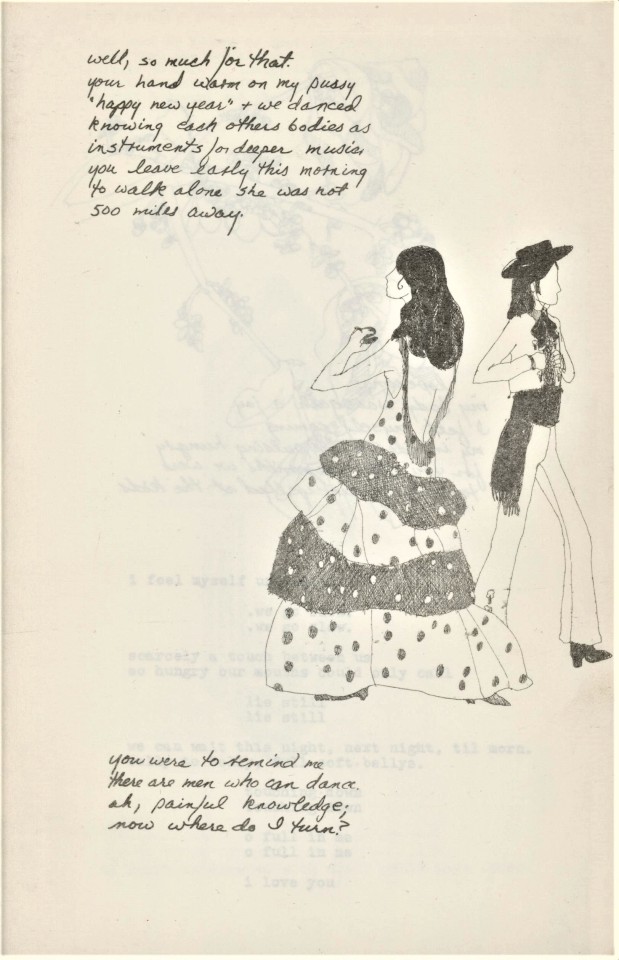
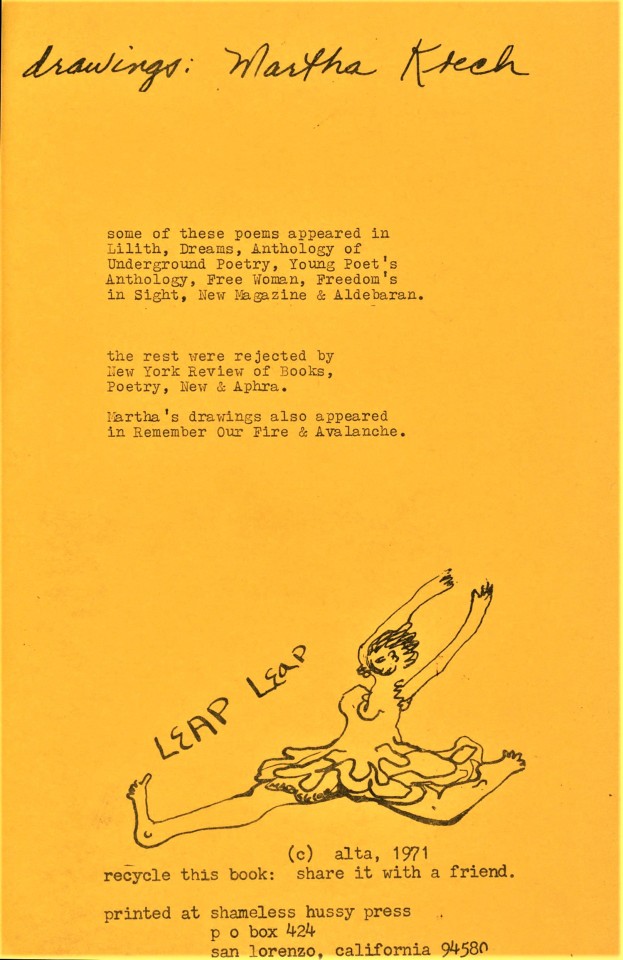
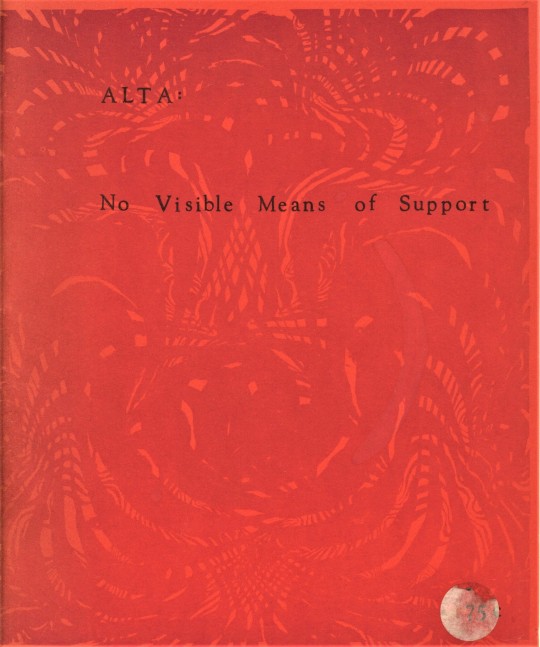
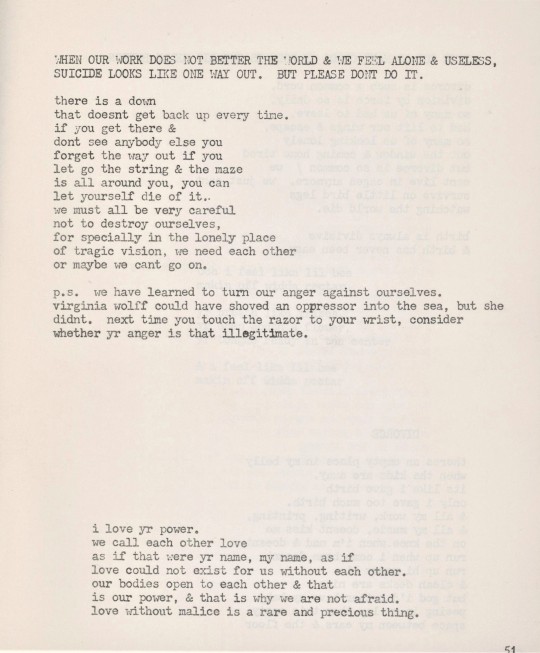
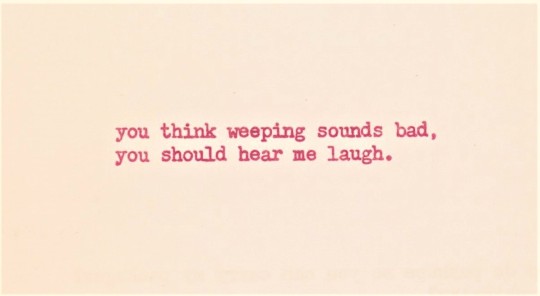
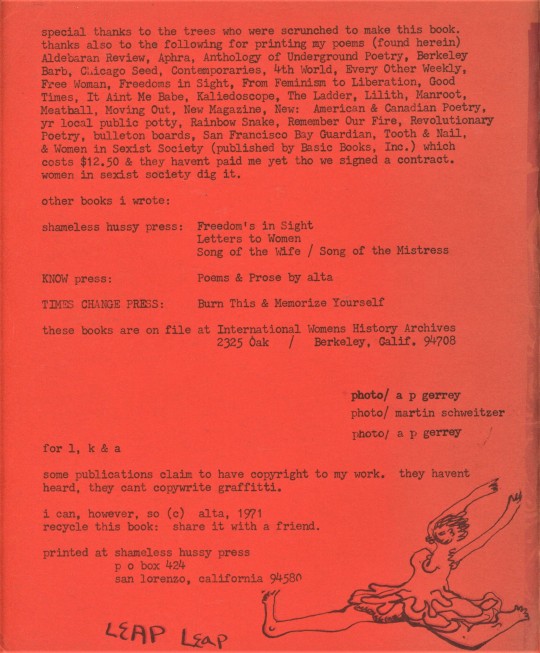
First Feminist Press!
Shameless Hussy Press
With the stress of Roe vs Wade potentially facing a repeal this summer, we want to let the women in our lives know they are not alone in their frustration. The fight women have been waging for their intellectual and bodily freedom has been a long one, so we wanted to revisit some history about the first women-owned feminist press in California, the Shameless Hussy Press! Poet and soon to be publisher Alta Gerrey founded the press in Oakland, California, in 1969, and would publish four women who later became prominent feminist writers: Pat Parker, Mitsuye Yamada, Ntozake Shange, and Susan Griffin. Alta published her own titles under her Shameless Hussy Press imprint, including three poetry collections preserved in our collection: Letters to Women, published around 1970; Song of the Wife; Song of the Mistress, published in 1971; No Visible Means of Support, published in 1971.
Alta’s sarcastic and straightforward writing style is reflected in the Shameless Hussy Press aesthetic. In her first collection, Letters to Women, she includes the iconic feminist symbol of a fist within the symbol of Venus and her copyright statement reads:
for underground reproduction without profit, there is no copyright. for moneymakers, this is copyright, and you gotta pay.
Alta emphasizes the aid of her friends and family in producing her book, and poetry aimed at letting women know that they were not alone in whatever injustices and hardships they faced, whether gender inequality and sexism, marriage and divorce, rape, mental illness, or raising children.
Alta’s second collection, Song of the Wife; Song of the Mistress, with drawings by Martha Kuech, reflects the intimacy the poet felt with her readers and how she used poetry as the outlet for emotions that could be a burden too heavy to carry at times. Letters to Women is dedicated “to every woman who is as isolated as i,” but Song of the Wife; Song of the Mistress "isn’t dedicated to anybody. eat yr hearts out.” Alta had a love for improper grammar, punctuation, and unconventional spelling. The first half of this second book reproduces a handwritten cursive script, presumably Alta’s handwriting, and the second half switches back to typewriter print. This title and Alta’s third collection, No Visible Means of Support, were both published after the Shameless Hussy Press had moved down the Bay to San Lorenzo, California, from its original location in Berkeley. Alta made the choice to move her independent press after the sabotage of a friend’s press in the same area, as well as to protect her daughter and herself from death threats she received for her work in the lesbian, feminist, and activist communities.
Shameless Hussy Press was the first to publish Ntozake’s Shange’s poetic performance work, For Colored Girls Who Have Considered Suicide When the Rainbow Is Enuf, which was later adapted into an Obie award-winning Broadway theater production. In 1976, Shameless Hussy published Camp Notes and Other Poems by Mitsuye Yamada, revolving around her experiences in the internment camps and the pain she felt at being perceived as an outsider.
The formation of the Shameless Hussy Press by Alta and the Women’s Press Collective by Judy Grahn, with aid from Pat Parker (who I posted about earlier), was quite inspirational for second wave of feminism. The four women who brought the feminist and lesbian publishing community to the foreground in California, Alta, Susie Griffin, Judy Grahn, and Pat Parker, had all met originally as neighbors over tea, but decided it was time to take action in their communities. Alta said in an interview that the group would often argue over how political their writing should be, wondering whether they should, “stick to the personal. [but] Susie kept saying, ‘the personal is political.’”
Griffin’s works were said to have launched ecofeminism in the United States as she rose to become one of the most influential American feminist writers of the 20th century. Alta’s Shameless Hussy Press gave these influential women the opportunity to be published outside the patriarchy of mainstream publishing, allowing them to completely claim their work as their own. Shameless Hussy ran from 1969-1989, despite being a one-woman-publishing house, publishing over fifty titles in its 20-y3qr existence.
–Isabelle, Special Collections Undergraduate Writing Intern
#Shameless Hussy Press#Alta Gerrey#Alta#Letters to Women#Song of Wife ; Song of Mistress#No Visible Means of Support#Judy Grahn#Feminist Press#Lesbian Poetry#Women's Press Collective#Pat Parker#Susie Griffin#Ecofeminism#Martha Kuech#Ntozake Shange#For Colored Girls Who Have Considered Suicide When the Rainbow is Enuf#Mitsuye Yamada#Camp Notes and Other Poems#Second Wave Feminism#Isabelle
29 notes
·
View notes
Text
*poem of the day*
by Alta (title unknown)
that chick is SO REVOLUTIONARY
she dresses poor on purpose.
she eschews the boozhwa comforts like
washing machines, male lovers, &
flush toilets. i mean she is
EVERY KIND of revolutionary!
she’d bum off her friends before she’d work
in a counter-revolutionary government job!
(how come she can afford to be so revolutionary?)
i mean, this chick is SO REVOLUTIONARY,
she laughs at housewives, agrees that
we’re an inferior breed.
she would never have a kid if she could have
an abortion instead. get it? this chick is
SELF FULFILLED!
super chick ta daa!
even her period glows in the dark.
#alta#alta gerrey#poet#poetry#feminism#feminist poetry#women poets#women writers#the voices of women#shameless hussy press
8 notes
·
View notes
Photo



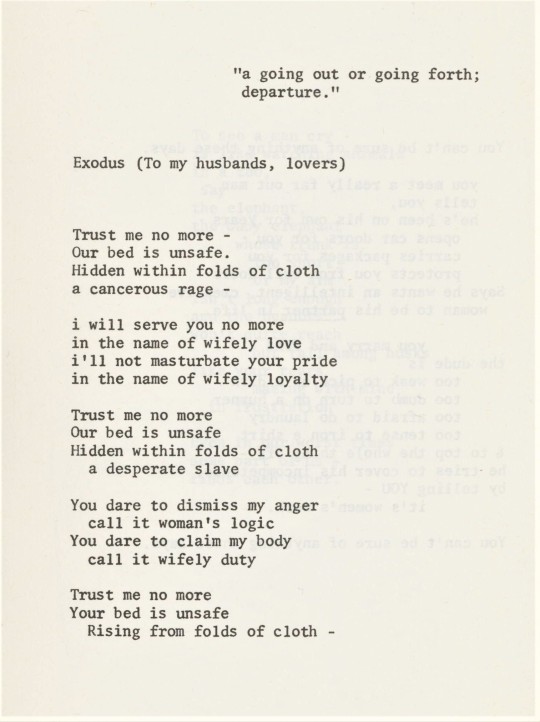




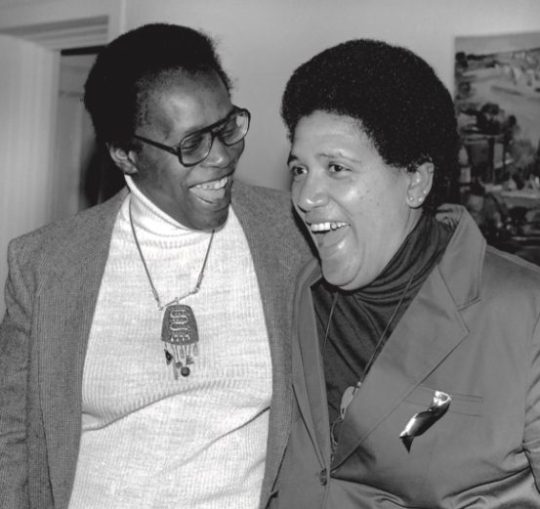
Staff Pick of the Week
Child of Myself
Our collection preserves a second printing of American poet and activist Pat Parker’s first poetry book, Child of Myself, published in 1974 by the Women’s Press Collective. The illustrations for this printing were done by Brenda Crider, Wendy Cadden, Jerri Robertson, Karen Garrison, and “Helle.” Over the course of her life, Parker published five collections of poetry and was a champion in the fight for women’s and LGBT liberation.
Parker’s activism was extensive. Parker was the founder of the Black Women's Revolutionary Council in 1980; an early supporter of groups like the Black Panther Party; and the executive director of the Oakland Feminist Women’s Health Center from 1978 to 1987—a revolutionary organization, offering abortion healthcare to women in California, which inspired the formation of the still active, Chico Feminist Women's Health Center (CFWHC). She also aided in the formation of the Women’s Press Collective, the publisher of her first two poetry books. The Collective was established by photographer, printer, and publisher, Wendy Cadden, and her partner Judy Grahn, an Air Force officer turned poet and activist after being discharged for being openly gay. Producing books, poems, and graphics, the press strove to promote work by lesbians disenfranchised by race or class.
In Child of Myself, Parker challenges the socially accepted power dynamics of heterosexual relationships through critiques on women’s prescribed roles as housekeeper and caretaker. When reading Parker’s stream-of-consciousness poetics, we have to step back and appreciate the bravery of these Black, LGBT, women feminists, who endured in the face of multiple systems of oppression. Parker and friends’ fight for women’s liberation was even acknowledged by Black Panther Party Leader, Huey P. Newton, in a 1970 interview:
...we say that we recognize the women’s right to be free. We have not said much about the homosexual at all, but we must relate to the homosexual movement because it is a real thing. And I know through reading, and through my life experience and observations that homosexuals are not given freedom and liberty by anyone in the society. They might be the most oppressed people in the society.
Child of Myself was originally published in 1972 by Shameless Hussy Press, founded by Alta Gerrey in Oakland in 1969—the first feminist press in the United States! The release of this first poetry book was just the beginning of Parker’s incredible career as a champion for LGBT rights, coming out as lesbian after the release of her second collection, Pit Stop, published by Women's Press Collective in 1973, and again in 1975. Parker’s third poetry book, Womanslaughter, published in 1978 by American feminist publishing house, the Diana Press, revolves around the issue of femicide and the trauma of domestic violence. Parker often spoke publicly about these issues, kicking off day three of the first National Conference of Third World Lesbians and Gays, on October 15th, 1979, in Washington, D.C., with a speech about her sister’s tragic death at the hands of her husband.
Due to the Diana Press’s closure in 1979, Parker’s fourth collection, Movement in Black, published by the press in 1978, went out of print until 1983, when the Crossing Press (now a part of Random House’s Crown Publishing Group) issued a facsimile edition of the collection. By 1987 the book was once again unavailable, until, shortly after Parker's death in 1989, Firebrand Books published its first edition of the collection—this time, including a foreword by friend, poet, and fellow activist, Audre Lorde and an introduction by Judy Grahn. Ten years later, in 1999, Firebrand released An Expanded Edition of Movement In Black, which includes a new section of previously-unpublished work, an introduction by Cheryl Clarke, and "Celebrations, Remembrances, Tributes" by ten Black writers including Lorde, Angela Y. Davis, Pamela Sneed, and Barbara Smith (founder of Kitchen Table: Women of Color Press).
Parker’s fifth and final poetry collection, Jonestown & Other Madness, was originally published by Firebrand Books in 1985, then re-published in 1989, just before Parker’s death from breast cancer. If you click here, you can hear Parker read the title poem from the book. Parker’s legacy will not soon be forgotten. In June 2019, Parker was one of the inaugural fifty American "pioneers, trailblazers, and heroes'' inducted on the National LGBTQ Wall of Honor at the Stonewall National Monument (SNM) in New York City's Stonewall Inn. In 1991, the Pat Parker/Vito Russo Center Library, was founded to encourage and facilitate the reading and research of LGBT literature.
View other Staff Picks here!
–Isabelle, Special Collections Undergraduate Writing Intern
Author Portrait from the National Black Justice Coalition
Picture of Parker and Audre Lorde courtesy of Susan Fleischmann, 1981, with permission of Public Books.
If you or someone you know is suffering from domestic violence and looking for help, don’t hesitate to reach out to the free, 24/7, hotline through text, chat, or call at 800-799-7233.
#Staff Pick of the Week#Isabelle#Pat Parker#Child of Myself#Pit Stop#Womanslaughter#Movement in Black#Jonestown and Other Madness#Women's Press Collective#Black Women's Revolutionary Council#Black Panther Party#Huey Newton#Feminist Women's Health Center#Women's Liberation#Civil Rights#LGBT Liberation#LGBT writers#poetry#Chico Feminist Women's Center#Wendy Cadden#Judy Grahn#Shameless Hussy Press#Alta Gerry#Diana Press#Firebrand Books#National LGBTQ Wall of Honor#Stonewall National Monument#Audre Lorde#Crossing Press#Center Library
127 notes
·
View notes